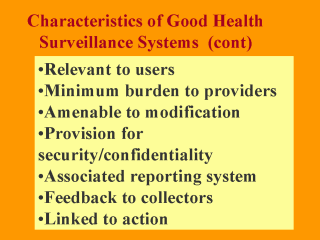| front |1 |2 |3 |4 |5 |6 |7 |8 |9 |10 |11 |12 |13 |14 |15 |16 |17 |18 |19 |20 |21 |22 |23 |24 |25 |26 |review |
 |
Both data items
and reports deriving from them should make sense to users of reports (health planners,
policy-makers, researchers). Obviously to obtain the cooperation of staff in collecting the data, the system should not require great time investment or mental effort. Ideally, should be part of their routine business operation. Having a futuristic approach , data bases should be flexible enough to allow insertion or deletion of fields as the need arises. All information systems containing private or identifiable data items should be secured with access passwords and encryption if information is to be electronically transferred. Having an in-built reporting template system would facilitate production of regular updates. Important but often ignored, is to feedback comments on quality, completeness and usefulness to the people who are directly involved in the collection of data. Finally, information systems are not justifiable if they are not linked to action to address the findings. |